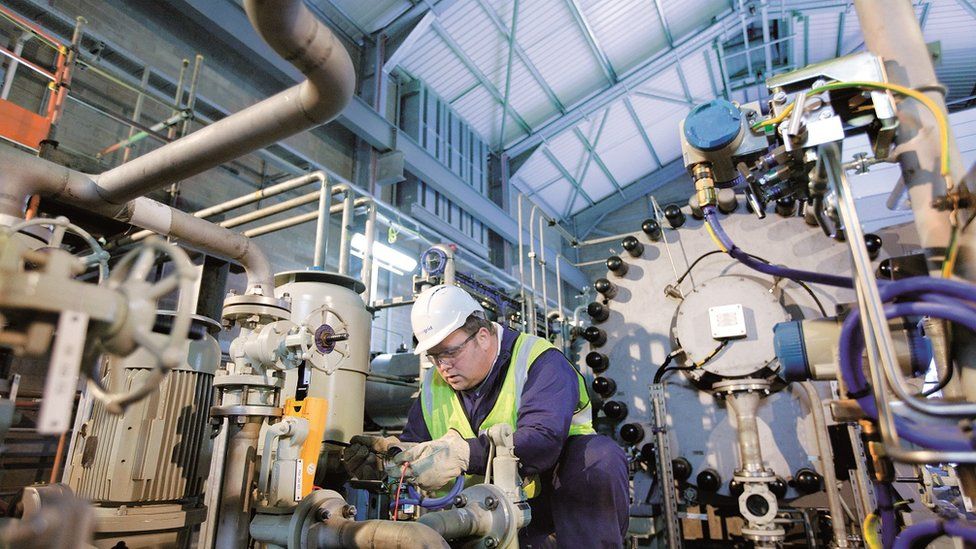National Grid deal 'should be halted', says GMB union
- Published

The sale of a key part of the UK's energy infrastructure should be halted, according to the GMB union.
Initial bids were due by Friday night for National Grid's gas distribution arm, which supplies millions of homes.
However, the union called on PM Theresa May to intervene and put the sale on hold until new safeguards covering the sale of national assets are introduced.
Foreign bidders are said to be eyeing the business, which analysts believe could be worth £11bn.
Potential buyers are thought to include a Chinese consortium and one of Asia's richest businessmen.
'Proper safeguards'
The sale comes as the government seeks to tighten up rules surrounding foreign takeovers of critical infrastructure, which will include a review of the Enterprise Act.
But the GMB says the sale should now be stopped.
"Theresa May should intervene and put this sale on hold until the review of the Enterprise Act is completed and there are proper safeguards in place," said Justin Bowden, GMB national secretary for energy.
"If it was good enough in her opinion to delay the go-ahead to Hinkley Point, then it is certainly good enough to put the brakes on here," he said.
National Grid announced plans to sell a majority stake in its gas distribution business last year. It comprises four regional networks which provide gas to some 10.9 million customers.
The regulated business made an operating profit of £428m in 2015.
However, the prospect of this key part of the UK's energy infrastructure falling into foreign hands is raising concerns.
"This is not a cash cow but a key piece of infrastructure, vital to our economy," Mr Bowden said.
"Just days after the government promised to review the Enterprise Act and introduce some long-overdue checks and balances into the sale of our key assets, yet another example comes down the line of fundamental UK infrastructure being flogged off to the highest foreign bidder", he added.
Robust system
Last week, the government said it would impose "significant new safeguards" for future foreign investment in the UK's critical infrastructure.
However, this sale is expected to be completed by early next year which would be before the new takeover measures are in place.
The Department for Business, Energy & Industrial Strategy (BEIS) insists that the government currently has a robust system to look at merger cases to defend national security.
This allows the secretary of state to intervene in transactions if there are issues of public interest.
A BEIS spokesperson said: "The safety and security of our infrastructure is non-negotiable. There are already robust processes in place to carefully scrutinise investment and ensure the safe operation of our electricity and gas networks."
National Grid is selling the networks to focus on higher growth parts of its operations.
"Gas demand in the UK has fallen nearly 20% in a decade", said Peter Atherton, an associate at Cornwall Energy Consultants.
"So National Grid is looking to sell as it sees gas networks as low growth going forwards".
But the business is proving attractive to foreign investors.
"It's rare for a business of this size to come on the market so global investors are attracted," Mr Atherton said.
"Investors are desperate for assets that can provide a decent dividend yield and UK regulated utility networks do just that," he said.
Foreign bidders
Likely bidders for the network are thought to include Li Ka-Shing, the Hong Kong based billionaire regarded as one of the most powerful businessmen in Asia.
The BBC understands representatives of his investment vehicle Cheung Kong Infrastructure (CKI) met with National Grid's management to discuss the sale some months ago.
Others reported to be tabling bids include Chinese conglomerate Fosun and consortia led by the Canada Pensions Plan Investment Board and the Australian banking giant Macquarie.
The government's plan for new takeover safeguards emerged last week when it gave the green light to Hinkley Point C, the first new nuclear plant in the UK for a generation.
China's CGN will provide around a third of the funding for the £18bn project, with the rest coming from the French energy giant EDF.
But in return the Chinese want to build their own reactor technology at Bradwell in Essex, giving their nuclear industry a foothold in the West.
The government says that it will take a "special share" in future nuclear projects to prevent stakes being sold without consent.
- Published10 November 2015
- Published17 June 2016